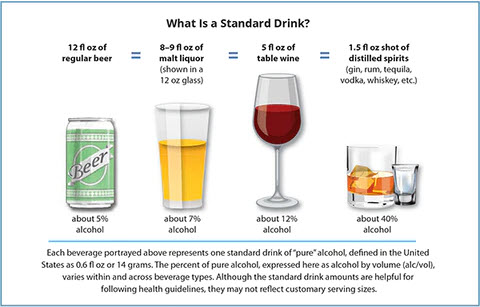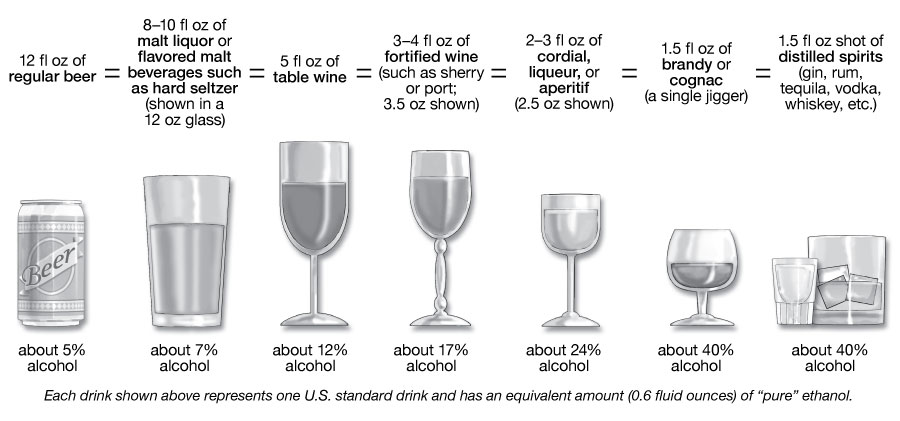Alcohol Content of Common Beverages
| Beverage | % Alcohol by Volume | Typical Serving Size | Alcohol in Typical Serving Size |
|---|---|---|---|
| Regular Beer | 5% | 12 ounces | .60 ounces |
| Light Beer | 4% | 12 ounces | .48 ounces |
| Table Wine | 12% | 5 ounces | .60 ounces |
| Wine Cooler | 5% | 12 ounces | .60 ounces |
| Vodka | 40% | 1.25 ounces | .50 ounces |
| Gin | 40% | 1.25 ounces | .50 ounces |
| Rum | 40% | 1.25 ounces | .50 ounces |
| Tequila | 40% | 1.25 ounces | .50 ounces |
| Bourbon | 40% | 1.25 ounces | .50 ounces |
| Scotch | 40% | 1.25 ounces | .50 ounces |
This table shows the approximate alcohol content in typical servings of common alcoholic beverages. The figures shown are averages for all brands. The actual amount of alcohol in any type of drink varies somewhat from brand to brand.
Everyone processes alcohol differently. For an idea of how alcoholic beverages could influence your blood alcohol content, learn how BAC is calculated.
What is Considered a Standard Drink?
Many are taken aback to find out what is considered a “drink”. The quantity of liquid in one’s glass, can or bottle does not equate to the actual alcohol amount. Beer, wine, or malt liquor can have varying levels of alcohol. For instance, light beers can have close to the same amount of alcohol as regular beer – almost 85%. In other words:
- Regular full strength beer has 5.0% alcohol content
- Some light beers have 4.2% alcohol content
- It is essential to be aware of both the quantity and alcohol content of your drinks. One “standard” drink (or one alcoholic drink equivalent) in the US holds 14g of pure alcohol, which is equivalent to 12oz of 5% beer, 5oz of 12% wine, or 1.5oz of 40% spirits.

How to know how much alcohol is in your drink?
The drinks below are examples of “one standard drink”, even though they come in different sizes:
Note: Each drink listed above represents one U.S. Standard drink and has an equivalent amount (0.6 fluid oz.) of “pure ethanol.

What is excessive drinking?
Bing drinking, heavy drinking, and any drinking by people younger than 21 or a pregnant women is included as excessive drinking.
- Binge drinking, the most common form of excessive drinking, is defined as consuming
- For women, 4 or more drinks during a single occasion.
- For men, 5 or more drinks during a single occasion.
- Heavy drinking is defined as consuming
- For women, 8 or more drinks per week.
- For men, 15 or more drinks per week.
Factors that skew a standard drink size
The standard drink size is a measure of how much alcohol a person drinks. It is based on how much alcohol a person drinks, but many factors influence how much alcohol a person drinks. For example, the serving size of a drink, the amount of alcohol in the drink, and who poured the drink can all affect how much alcohol a person drinks. The standard drink size is the only accurate measure of how much alcohol a person drinks.
For a FREE Case Evaluation with an award-winning DUI-DWI attorney, call or submit your case details. Our Georgia DUI attorneys and traffic ticket lawyers near me are available 24 hours/7 days a week at 1-844-TEAM-DUI (1-844-832-6384).
Copyright 2022. William C. Head. All Rights Reserved.